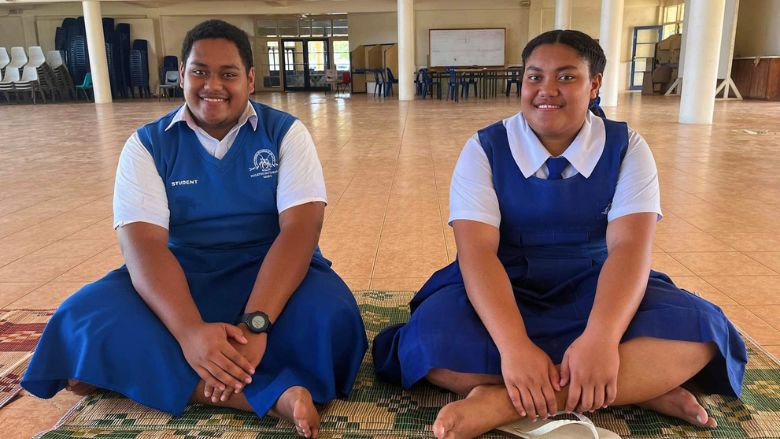16-year old Folauhola (Folau) Fakatene is a Form 6 (Year 12) student at Mailefihi College, on Tonga’s island of Vava’u, some 300 kilometers north from the country’s main island of Tongatapu. He is the youngest of five siblings, and like many other teenagers, he enjoys going to school and hanging out with his classmates. Folau scooped several awards for the 2022 academic year including overall Dux award for Mailefihi College. Yet Folau’s education journey hasn’t always been smooth sailing.

World Bank
STORY HIGHLIGHTS
- 16-year old Folau Fakatene loves school, but has faced big obstacles to complete his education; a common story throughout Tonga, with an estimated 21 percent of young Tongans not attending school.
- World Bank support is helping Tonga address the challenge of high school dropout rates, through cash assistance to families to help their children complete their secondary education.
- Initial results from the project are encouraging, with dropout rates now reducing, ensuring more young Tongans can achieve their full potential.

Folauhola Fakatene, a recipient of the conditional cash transfer under the Skills and Employment for Tongans (SET) project, after scooping his awards for Mailefihi College.
World Bank
“It hasn’t been easy for me and my family; especially after my dad passed away when I was only two years old, leaving my mother to provide for me and my siblings,” reflects Folau, who says that his mother, ‘Alisi, ‘had to pay for school fees, uniforms and textbooks for all of her children.’ Yet, says Folau, she always did the best she could with what she had.
“Mum always reminded us just to always do our best in school because our education is our future,” says Folau. “That’s why I must study hard and that’s what motivates me.”
Far too many Tongan teenagers have been unable to overcome such economic obstacles – with 21 percent of students between 15 to 24 years currently not attending school.
Critically, dropout numbers are higher for students from poorer families; particularly those who have felt the impacts of the successive economic shocks that have hit Tonga in the last few years; Cyclone Gita in 2018, Cyclone Harold in 2020, the massive Tonga Hunga-Tonga Hunga-Ha’apai volcanic eruption and tsunami (2022), and the COVID-19 pandemic, which saw international borders completely closed for more than two years.
Collectively, these have left a significant mark on Tongans. January 2022’s eruption was dubbed a ‘once in a millennium’ event; one that cost an estimated US$90.4 million in damages (or about 18.5 percent of Tonga’s Gross Domestic Product). Combined with the pandemic – which saw the closure of businesses and schools, the near-shutdown of the tourism, retail and agriculture sectors – Tonga’s economy faced a contraction of an estimated 2.7 percent (2021 figures) and an increase in families doing it tough, with economic hardship as one of the factors in children’s secondary education being cut short.
The US$20.9m Skills and Employment for Tongans (SET) Project, which is jointly funded by the World Bank and Australian Government, aims to support Tonga to address secondary school dropout rates, as well as to increase employment opportunities through improved technical and vocational education and training (TVET) and international labor opportunities.
“To have a workforce that is prepared for more skilled jobs and able to effectively compete in both the local and global economy, it is vital for a country to invest in its people; to build human capital,” said Stefano Mocci, World Bank Country Manager for the South Pacific. “That’s why we are proud to be supporting the Tongan Government in efforts to do just that.”
The five-year project, led by Tonga’s Ministries of Internal Affairs (MIA), Education & Training (MET), and Finance (MoF), has four components that include a conditional cash transfer (CCT) program – a first of its kind to be implemented in the Pacific – providing approximately US$100 per student per school term for secondary school enrollment (or TOP 1,000 every year) – to ensure families that are facing financial difficulties are able to continue to support their children’s education.
“The World Bank’s support for the cash transfer program means more children can complete their secondary school education,” said Hon. Hu'akavemeiliku Siaosi Sovaleni, Tongan Prime Minister and Minister for Education and Training, who explained that students participating in the CCT program are required to be enrolled in and attend school on a regular basis to receive these funds, with payments to cover expenses like school fees, meals, uniforms and textbooks.
The aim is, “to reduce the financial burden for poorer families to send their children to school, making a real difference in their lives by creating more opportunities for them towards a better future,” he said.
Through the CCT, the project initially aimed to support 450 families, scaling up to an end target of 1,500 households within five years. The CCT has surpassed these expectations and demonstrated positive initial results. To date, the transfers supported a total of 3,880 students or approximately 2,100 families in 2022. Monitoring of the program indicated that 94 percent of the CCT students attend school at least 80 percent of the time.
“I’m able to concentrate more on my studies and do well in school so that I can one day get a good job and help my mum take care of the rest of my family,” says Folau.
He adds: “I’d like to be a banker, but I also want to be a teacher, because I want to be able to help other students who may also be facing challenging times, in the same way my teachers have helped me through my own challenges too.”
The Skills and Employment for Tongans (SET) Project is funded through an US$18.5million grant from the International Development Association (IDA)* – the World Bank’s fund for the world’s most in-need countries, together with a US$2.4million grant from the Australia-Pacific Islands Partnership (APIP) Trust Fund.
*IDA: The World Bank’s International Development Association (IDA), established in 1960, helps the world’s poorest countries by providing grants and low to zero-interest loans for projects and programs that boost economic growth, reduce poverty, and improve poor people’s lives.

